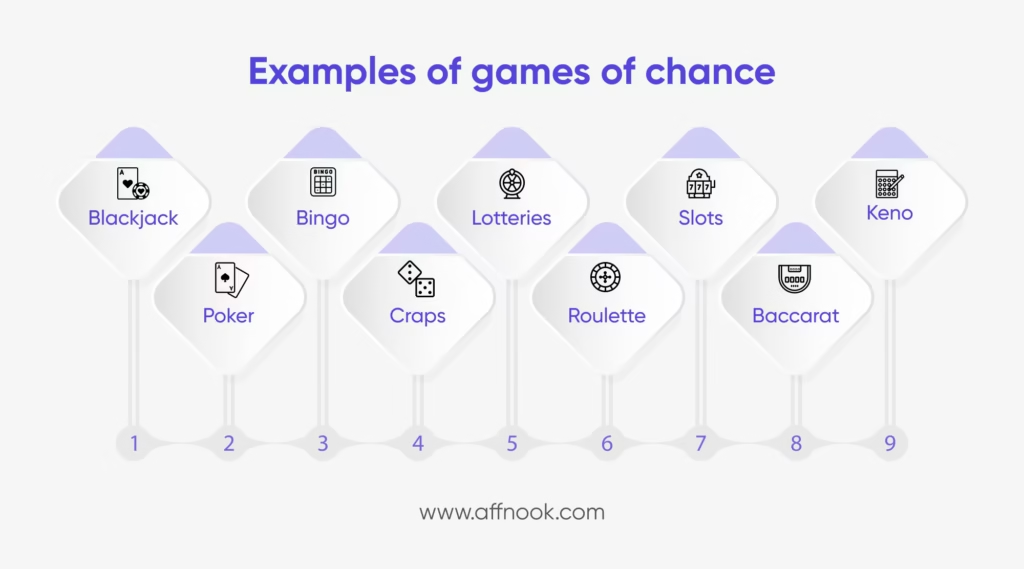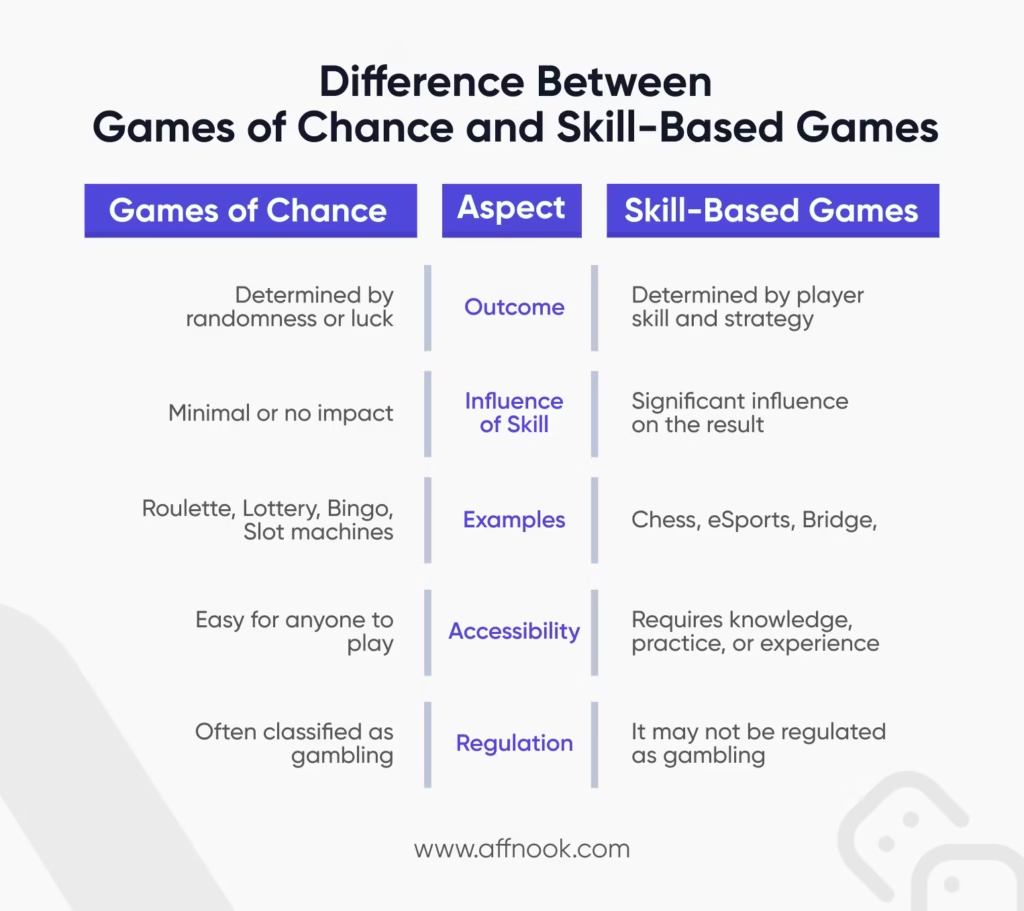What if your actions didn’t matter, and all outcomes were up to luck?
That’s what games of chance are.
It is defined as a game in which the outcome is heavily influenced by random events, rather than the skills or decisions of the participants. These games have been a source of entertainment for centuries.
More than 26% of the global adult population participates in gambling activities each year, with games based on chance being one of the most popular choices amongst them.
These games captivate players with their simplicity, quick outcomes, and the thrilling unpredictability that keeps them coming back for more. But what makes them so popular? It’s the perfect mix of luck, excitement, and the allure of potentially life-changing wins that appeals to such a broad audience worldwide.
In this article, you will learn about the essence of chance-based games, provide examples, explore their legality, and contrast them with skill-based games.
What are Games of Chance?
A game of chance is an activity where the players do not know the result of the game. While they can use some strategies from their past experiences, their efforts rarely affect the overall result.
This type of randomness in these games creates a scenario where any player can win, regardless of their experience or expertise.
Commonly, such games involve elements like dice, spinning wheels, shuffled cards, or number draws. These mechanisms introduce unpredictability, ensuring that outcomes cannot be predicted or controlled.
Examples of Games of Chance
They are fairly common, with most people experiencing some form of chance during gameplay, at some or the other point in their lives. Here is a list of the ones that are popular across the globe:
- Lottery: In a lottery, players buy tickets with random numbers and winners are picked through a random draw. Lotteries, like national or state ones, often have huge jackpots that can change a person’s life.
- Slot Machines: These are machines that you find in casinos where you pull a lever or press a button to spin reels with symbols. The outcome is completely random, and each spin is different. They also often have colorful themes and exciting bonus rounds.
- Roulette: In roulette, players bet on where a ball will land on a spinning wheel. There are many ways to bet, with different payouts, depending on where the ball lands.
- Bingo: In bingo, numbers are drawn at random, and players cross them off their cards as they are called. The first player to match a certain pattern wins. It’s often played in social settings like community centers, making it fun and interactive.
- Craps: This dice game involves players placing bets on the result of a roll. It’s quick and full of action, making it a popular choice in casinos.
- Keno: Similar to the lottery, in Keno players pick numbers, and then numbers are drawn randomly. You will win if your numbers match the drawn ones!
- Wheel of Fortune: In this game, players spin a large wheel that determines which prize or payout they win. The wheel’s outcome is completely random, making each spin exciting and unpredictable.

Key Features of Games of Chance
Let’s understand the key what makes such games stand out when compared with their skill based counterparts in the iGaming industry:
- Randomness and Luck: Such games operate on principles of randomness, often facilitated by tools such as dice, shuffled cards, spinning wheels, or digital algorithms. No one person has control over the outcome.
- Accessibility: These games are made simple so that everyone can enjoy them.
- Low Skill Requirement: In this kind of game, there are no specific skills required to play games. You don’t need any technical skill or know-how to appreciate a chance-based outcome
- Unpredictability: The results of these are uncertain and cannot be anticipated or controlled, which adds to the thrill of the game.
- Wagering: Players typically place bets or stakes before participating, hoping to win based on the randomness of the game. Without any basis or certainty, you have to put your faith in one outcome over the rest of the others.
- Variety of Formats: Games of chance can come in many forms, including dice games, card games, roulette, lotteries, and slot machines.
- Instant Results: Most games of this nature offer immediate outcomes, adding to the excitement and quick gratification.
- Element of Luck: The primary factor in determining the outcome is luck, with no guarantees of winning, regardless of how many times a person plays. This means in certain instances, you may never win. In others, you may keep winning, until your fate changes.
Popular Games of Chance Around the World
Here are some popular areas where these games are widely enjoyed.
Asia
- Sic Bo (Dice Game): Originating in China, Sic Bo is a dice game where players bet on various combinations of three dice rolls. It’s commonly played in casinos across Asia, especially in Macau.
- Pachinko: A Japanese game that combines slot machines and pinball. Players drop metal balls into a vertical machine, and they win prizes based on where the balls land.
- Mahjong (in some versions): While traditionally a game of skill, some versions of Mahjong played in casinos involve betting and chance elements, especially in the gambling culture of places like Macau.
- Keno: Keno is widely played in many Asian countries, particularly in China, where players choose numbers and hope they match the randomly drawn numbers.
Europe
- Baccarat: This card game is favored in many European casinos, particularly in France and Italy. Players bet on whether the player’s hand or the dealer’s hand will win, and the outcome is determined by chance.
- Roulette: One of the most iconic casino games, roulette is immensely popular in Europe, especially in countries like France, Monaco, and the UK. Players bet on where a ball will land on a spinning wheel, with various betting options available for different payouts.
- Lotto (National Lotteries): National lotteries are widespread across Europe and one of the most common games of chance. For example, the UK National Lottery, EuroMillions (played in multiple countries), and France’s Loto offer large jackpots through random number draws.
- Bingo: Bingo is played widely across Europe, especially in the UK, Spain, and Italy. It’s a simple, social game where players match randomly drawn numbers on their cards to win.
- Slot Machines: Slot machines are common in European casinos and on online gaming sites. Players spin reels to match symbols, with outcomes determined by random number generators (RNGs).
North America
- Powerball and Mega Millions (USA): Lotteries are widely played across North America, with major games like the Powerball or Mega Millions in the U.S. and Lotto Max or Lotto 6/49 in Canada. Players select numbers (or use random selection) and hope to win a jackpot determined by a random draw.
Africa
- Lucky Draws (Tombolas): Common in social events, tombolas or lucky draws involve participants purchasing tickets for a chance to win prizes. These games of chance are often used in promotions, festivals, and charity events across various African countries.
South America
- Cacho (Craps Dice Game in Peru): Cacho is a traditional dice game in Peru that is popular among families and groups of friends. Similar to the casino game craps, players roll dice and bet on the outcome, often creating a lively, competitive atmosphere. This is commonly played at festivals, celebrations, or social gatherings, with large groups of people participating.
- La Quiniela (Argentina): La Quiniela is a lottery-style game particularly popular in Argentina, where players bet on the outcome of the results of various events, often based on sports outcomes or the results of the previous day’s lottery. This cultural game of chance has deep ties to Argentine life, often involving predictions on local events, making it more of a communal ritual, especially around big sporting events.
Australia
- Tattslotto: Tattslotto is another popular lottery game in Australia, primarily in the state of Victoria. It’s similar to traditional lotto games where players choose numbers, and if their numbers match those drawn, they win prizes. The game’s large jackpots and simple mechanics make it a favorite among Australians.
- Pokies (Slot Machines): Pokies, the Australian term for slot machines, are a staple in Australian pubs, clubs, and casinos. These machines operate on random number generators (RNGs), with players spinning reels to match symbols in hopes of winning jackpots or smaller payouts. Pokies are widespread across the country, particularly in venues like the Sydney Opera House and Melbourne’s Crown Casino.
Difference Between Games of Chance and Skill-Based Games
Understanding the distinction between a game of chance and skill-based games is crucial, particularly in contexts like legal definitions and player preferences.
In several countries only one is allowed. In some both are regulated. Knowing how they vary will help you curate the right type of experiences on your iGaming platform.

Risks and Responsible Gaming
While games of chance provide entertainment, they also pose risks, including addiction and financial harm. Promoting responsible gaming is crucial to mitigating these issues.
- Addiction Risks: The randomness of these games can lead to compulsive behaviour. Players may keep doing the same actions, hoping for different results.
- Responsible Gaming Initiatives: Organizations like Gamblers Anonymous and GambleAware provide support. It is important to let players know of the resources available for them in case they are at risk or demonstrating such behaviours.
- Government Regulations: Many countries mandate self-exclusion programs and impose limits on advertising. It is critical for iGaming businesses to offer these on their platform.
- Technological Solutions: Online platforms offer tools like deposit limits and playtime reminders. This will ensure engagement is not unregulated and endless.
Conclusion
It is clear that games of chance are popular worldwide because they are simple and offer the excitement of luck. They exist in some form of the other throughout the globe.
From classic dice games in Asia to online slot machines played globally, these games are always changing while keeping their basic fun. Historical instances set precedents for enjoying leisure, while leaving the outcome of such activities to fate.
As the gaming industry grows, it’s important to make sure that it stays enjoyable while also being responsible. While being addictive, chance-based games can be enjoyed in moderation. For businesses, it is vital to be responsible while promoting such activities.
Help Section
1. What is a game of chance?
A game of chance is a type of game where the outcome is primarily determined by random factors rather than the player’s skill or strategy. Examples include lotteries, slot machines, roulette, and bingo. While some games may involve small elements of strategy, luck is the dominant factor that decides who wins.
2. How is a game of chance different from a skill-based game?
The key difference between a game of chance and a skill-based game lies in control. In games of chance, luck determines the outcome, while in skill-based games, player ability and decision-making play a larger role. For example, poker and fantasy sports involve skill, whereas roulette or slots depend entirely on random outcomes.
3. Is playing a game of chance legal online?
The legality of playing a game of chance online depends on local gambling laws. Some countries allow regulated chance-based games under licensed operators, while others restrict or ban them entirely. Always check your region’s gambling regulations and ensure the platform you use is licensed and compliant.
4. What are some popular examples of games of chance?
Common examples of a game of chance include lotteries, slot machines, roulette, keno, bingo, and dice-based games like craps. These games are widely available in casinos, online platforms, and even social gaming environments due to their easy-to-understand rules and exciting unpredictability.
5. Can you improve your odds in a game of chance?
While you cannot control randomness in a game of chance, you can make informed decisions to manage risk. Choosing reputable platforms, setting betting limits, and understanding payout rates (like RTP in slots) can help you play responsibly and enhance your overall experience — though outcomes remain luck-driven.




